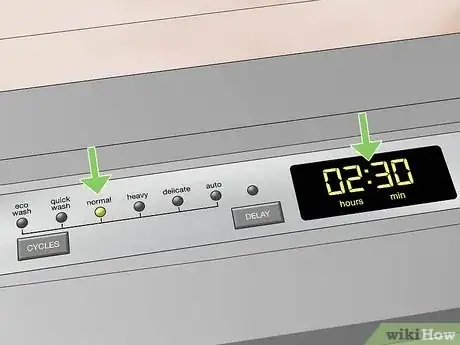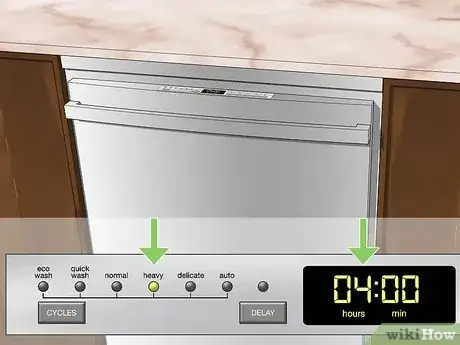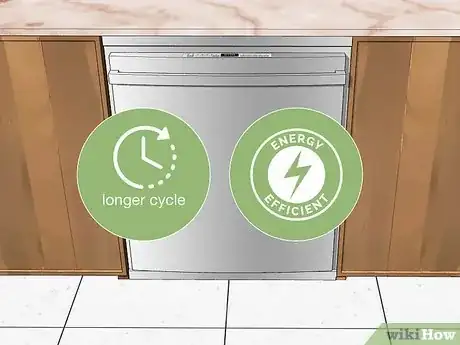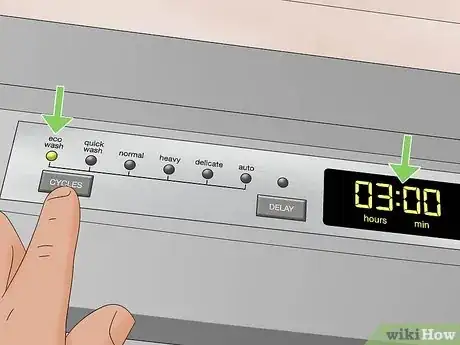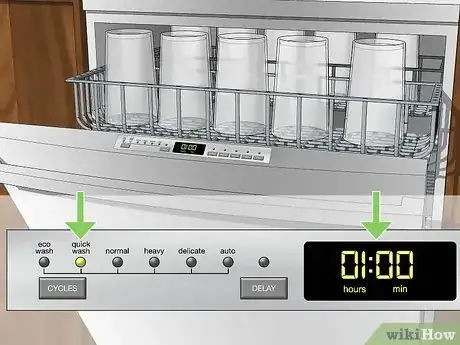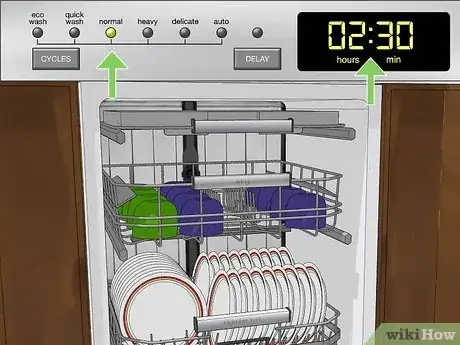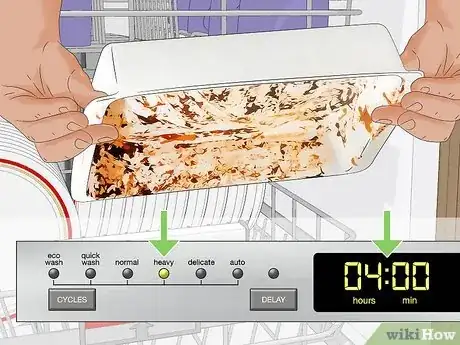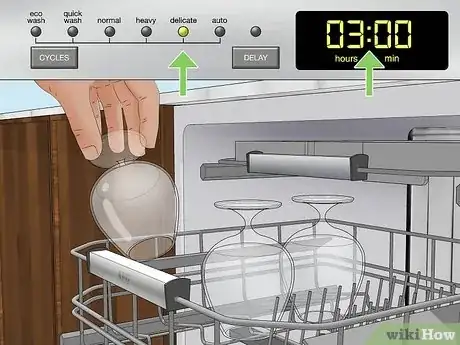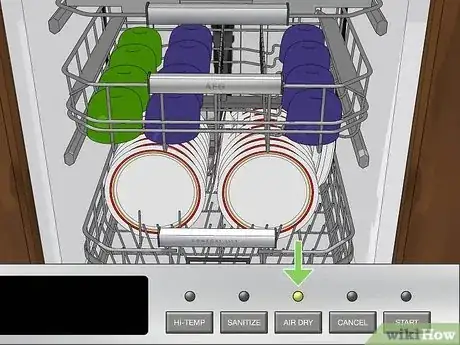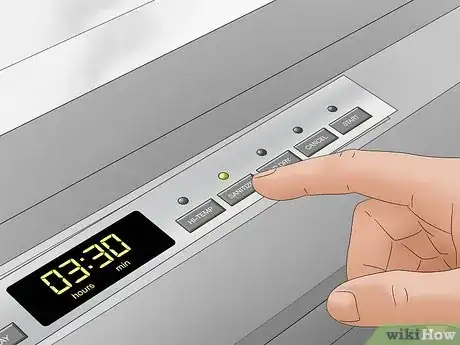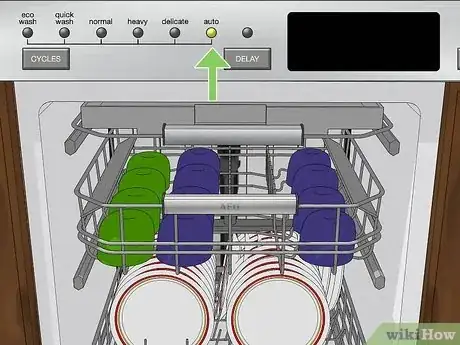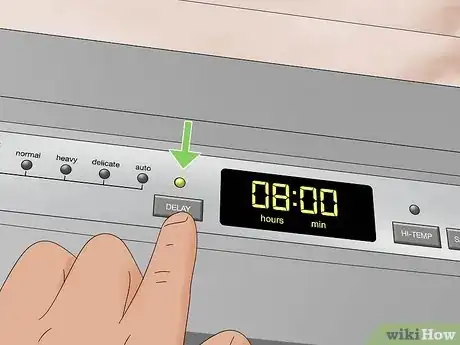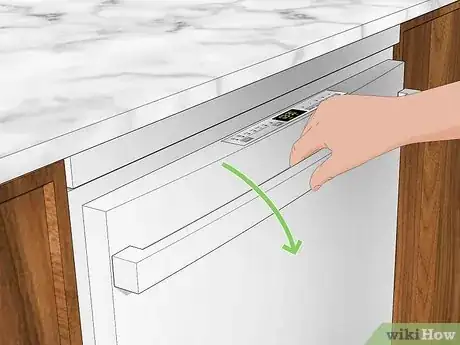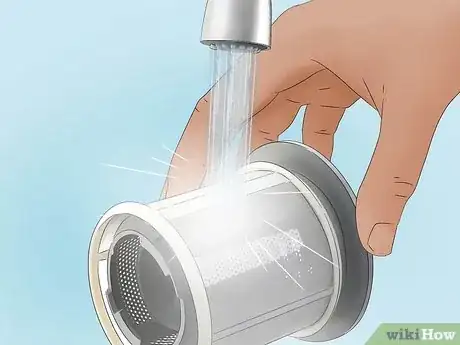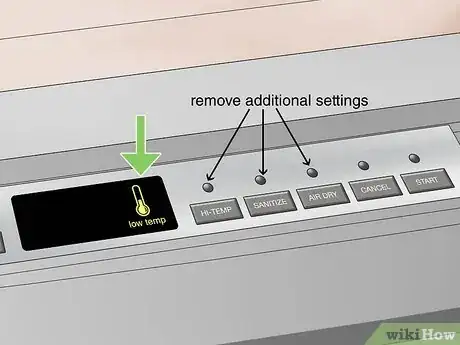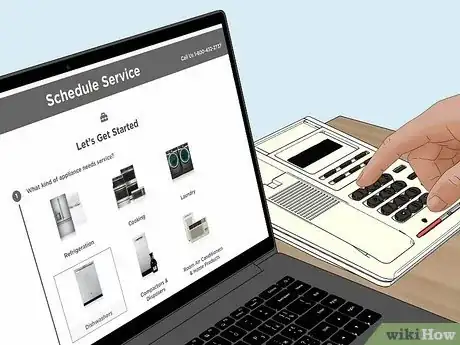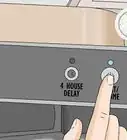This article was co-authored by wikiHow staff writer, Eric McClure. Eric McClure is an editing fellow at wikiHow where he has been editing, researching, and creating content since 2019. A former educator and poet, his work has appeared in Carcinogenic Poetry, Shot Glass Journal, Prairie Margins, and The Rusty Nail. His digital chapbook, The Internet, was also published in TL;DR Magazine. He was the winner of the Paul Carroll award for outstanding achievement in creative writing in 2014, and he was a featured reader at the Poetry Foundation’s Open Door Reading Series in 2015. Eric holds a BA in English from the University of Illinois at Chicago, and an MEd in secondary education from DePaul University.
There are 9 references cited in this article, which can be found at the bottom of the page.
Learn more...
Trying to figure out if you’ve got enough time to clean your dishes before company arrives? It’s a little odd that most dishwashers don’t have a display to show you how much time is left—especially when there are so many options and different cycles to choose from. In this article, we’ll break down how long the typical dishwasher runs. We’ll even explain what all of those extra buttons do (and how much time they add or subtract) so that you can pick the best cycle for you.
Things You Should Know
- A no-nonsense normal cycle will usually take about 1.5-2.5 hours, although a dishwasher can run up to 4 hours if you select extra features.
- Refer to your dishwasher’s manual to find specific time frames for the various options and cycle types on your machine.
- Quick wash is usually the fastest setting at roughly 0.5-1 hour, while the sanitize or heavy duty cycles can take up to 4 hours or more.
Steps
How long does a dishwasher cycle take?
-
1A typical “normal” cycle will take around 2 hours. It may take a little longer or shorter depending on your particular brand and model, but most of the “standard” or “normal” cycles out there will run about 2 hours.[1] X Research source
- In a rush? Skip any pre-wash or sanitization settings. Your dishes will get clean with a normal or quick cycle.[2] X Trustworthy Source Consumer Reports Nonprofit organization dedicated to consumer advocacy and product testing Go to source
- Wash times for each cycle are typically listed in the manual if you want to know precisely how long a given cycle will take.
- Keep in mind, the age of your machine, the type of detergent, and the size of your load will all influence how long a “normal” cycle takes.
-
2Custom or heavy-duty cycles can take up to 4 hours. If you run a heavy-duty cycle with an optional “sanitize” and “extra hot wash” adjustments or something along those lines, it can take up to 4 hours depending on your specific model/brand and the options you choose.[3] X Research source
- Optional settings are typically listed separately from the typical quick/normal/heavy wash settings.
- Heavy-duty cycles also usually rely on hot water, which takes a long time for your dishwasher to heat up.
Have dishwasher cycles gotten longer?
-
Yes, but it’s because they’re generally more energy efficient today. Old dishwashers just treated every load identically. Today, modern machines have all kinds of sensors that detect when the dishes are (at least mostly) clean. There are also regulations today surrounding how energy efficient appliances have to be, so modern dishwashers tend to take longer.[4] X Trustworthy Source Consumer Reports Nonprofit organization dedicated to consumer advocacy and product testing Go to source
- Sure, your old dishwasher might have been faster, but you’re better off from a cost and efficiency perspective with a slightly slower modern machine.
Common Cycles Explained
-
1Eco-wash (2-3 hours) Most dishwashers these days have some kind of eco- or energy-efficient mode designed to use less electricity and water. It usually uses lower temperature water and it’ll take longer than a normal cycle, but it’ll get your dishes clean without wasting energy.[5] X Research source
- Some dishwashers don’t have a mode like this.
-
2Quick wash (0.5-1 hour) This fast cycle is ideal for dusty dishes you just picked up at the store, or a bunch of glasses leftover from a party that weren’t sitting super long. It’s also a great option if you rinsed off the dishes. It’s not a great option if your dishes are super dirty, though.[6] X Research source
- Quick wash is sometimes listed as “fast cycle” or “quick cycle.”
-
3Normal cycle (1.5-2.5 hours) This is your go-to cycle for a boring old load of dishes. It’ll get the job done and it’s a good choice if you’ve got a full dishwasher full of dirty dishes and cutlery.[7] X Research source
-
4Heavy cycle (2.5-4 hours) If you’ve got caked-on cheese stuck to a baking dish, oily residue that won’t come off of your dishes, or generally filthy dishes that have been building up for the week, it’s time for the heavy duty cycle. The heavy cycle will completely purge any dirt of debris.[8] X Research source
- On some machines, the heavy cycle is labelled “heavy duty” or “high.”
-
5Delicate cycle (2-3 hours) Got some fine China, fancy wine glasses, or antique cutlery you want to protect? This is the cycle for you. It’ll rinse, wash, and dry the contents of your machine but with lower temperature water running at a lower pressure.[9] X Research source
-
6Air dry (saves 15-30 minutes) Are you one of those people who open the dishwasher when it’s done so the moisture doesn’t stick to your dishes? If so, hit this button. Your machine won’t run its normal dry cycle. When the wash cycle is done, just open the door and wait a few hours for the dishes to dry.[10] X Research source
- Air drying will cut back on your energy consumption and save you a few dollars when it’s time to pay the utility bill.
-
7Sanitize (3-3.5 hours) This is probably the most thorough and “intense” cycles out there. Your dishwasher will run the water at a temperature hot enough to kill a majority of common germs and bacteria. If anyone in your house is sick, the sanitize cycle will keep everyone else from getting ill.[11] X Research source
- On some machines, the sanitize cycle is labeled “Sani-rinse” or “SaniWash.”
-
8Auto clean (variable) Also called “sensor wash” on a lot of machines, this setting will automatically detect when your dishes are completely clean. Then, they’ll dry the dishes automatically by sensing the moisture level inside the machine.
- Since the dishwasher is scanning the contents of the machine, this cycle’s length will vary.
-
9Delay cycle This button typically adjusts when the machine starts. On many dishwashers, you can delay the machine up to 8 hours later after you’ve entered your preferred settings. This way, you can wait until everyone is asleep or you’ve left the house for the loud cycle in the kitchen to run.[12] X Research source
Can you open a dishwasher mid-cycle?
-
Usually, yes, but it’s best to avoid opening the machine if possible. Most machines these days have an open-door feature where it’ll continue whatever cycle the machine was on when you open the door. However, it’s not available on every single machine. On some machines (especially older models), opening the door will interrupt everything and force you to restart the cycle.[13] X Research source
- If your primary worry is water, rest assured that you aren’t going to cause a giant flood if you open the door.
- If you open the machine and you can’t get it to start back up again, press “start” and close the door. If you don’t hear the machine starting back up, it will probably drain and restart the cycle.
Troubleshooting a Slow Dishwasher
-
1Clear the filter and remove mineral buildup. Look on the inside bottom of your dishwasher for a drain with a filter in it. Food scraps often build up in there, so reach inside and clear them out to improve water flow. Then, scrub the arms and nozzles that spray water with dish soap and rinse it off—this will get rid of any minerals blocking the water flow.[14] X Research source
- Use a drain-clearing chemical to break down and food scraps blocking water from draining.
- A dirty filter and filthy nozzles can make it take a lot longer for your dishes to get clean. If you run any kind of auto-clean cycles, this will extend the time.
-
2Lower the water temperature and remove optional cycles. If you don’t have enough hot water to run a complete “hot water cycle,” it’ll take a lot longer for your appliance to run. On top of that, take off any add-on settings you normally use (like “sanitize”). This will speed up how long it takes for your dishwasher to finish its cycles.[15] X Research source
-
3Hire an appliance repair company if the dishwasher isn’t working. If your dishwasher isn’t working properly or it’s taking an abnormally long time to complete a wash cycle, contact an appliance repair company. You may have a bad motor, belt, or sensor, but none of these issues are DIY repairs, so reach out to a pro for help.[16] X Research source
You Might Also Like

 How to Fix Your Bosch Dishwasher and Restart It
How to Fix Your Bosch Dishwasher and Restart It
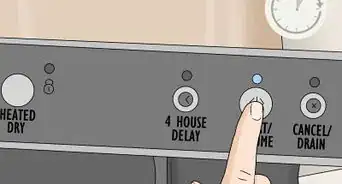


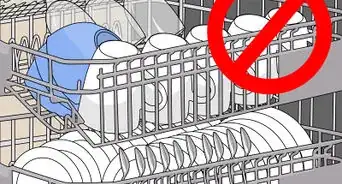
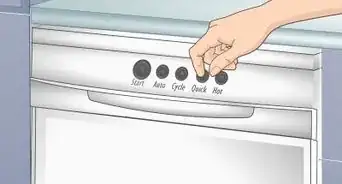 How to Fix a Dishwasher with Drainage Issues: Troubleshooting & Solutions
How to Fix a Dishwasher with Drainage Issues: Troubleshooting & Solutions



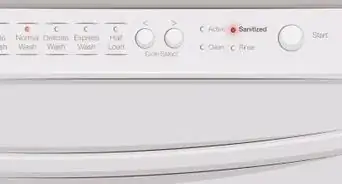
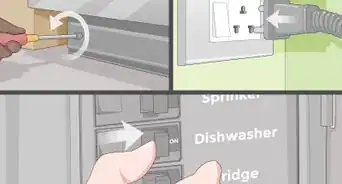
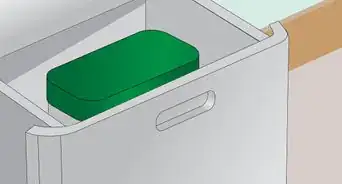
References
- ↑ https://www.kitchenaid.com/content/dam/global/documents/202007/cycle-guide-w11452406-reva.pdf
- ↑ https://www.consumerreports.org/cro/news/2014/04/why-does-my-new-dishwasher-take-so-long/index.htm
- ↑ https://www.kitchenaid.com/content/dam/global/documents/202007/cycle-guide-w11452406-reva.pdf
- ↑ https://www.consumerreports.org/cro/news/2014/04/why-does-my-new-dishwasher-take-so-long/index.htm
- ↑ https://www.choice.com.au/home-and-living/laundry-and-cleaning/washing-machines/articles/eco-function-buttons
- ↑ https://www.cnet.com/home/kitchen-and-household/this-is-what-all-those-buttons-on-your-dishwasher-do/
- ↑ https://www.kitchenaid.com/content/dam/global/documents/202007/cycle-guide-w11452406-reva.pdf
- ↑ https://www.cnet.com/home/kitchen-and-household/this-is-what-all-those-buttons-on-your-dishwasher-do/
- ↑ https://www.cnet.com/home/kitchen-and-household/this-is-what-all-those-buttons-on-your-dishwasher-do/
- ↑ https://www.cnet.com/home/kitchen-and-household/this-is-what-all-those-buttons-on-your-dishwasher-do/
- ↑ https://www.cnet.com/home/kitchen-and-household/this-is-what-all-those-buttons-on-your-dishwasher-do/
- ↑ https://www.geappliances.com/content/older-pdfs/49-59071.PDF
- ↑ https://kitchengeek.com/open-dishwasher-mid-cycle/
- ↑ https://www.bonappetit.com/story/how-to-clean-dishwasher-filter
- ↑ https://producthelp.jennair.com/Dishwashers/Product_Info/Dishwasher_Tips_and_Tricks/How_Water_Temperature_Affects_Cycle_Time
- ↑ https://www.dispatch.com/story/lifestyle/home-garden/2020/03/20/dishwasher-solutions-when-to-call/1490612007/
About This Article

